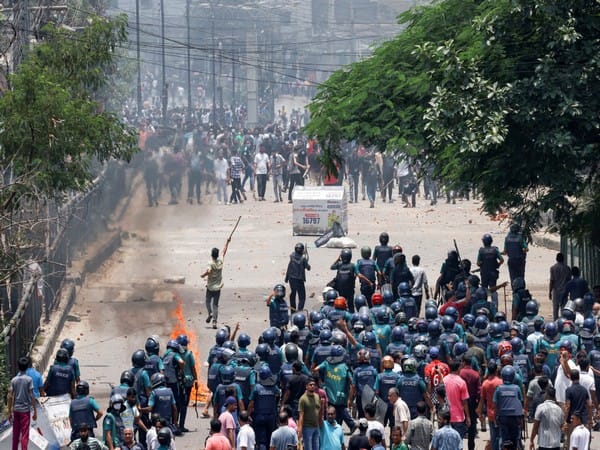New Delhi: Former Bangladesh Prime Minister Sheikh Hasina has no plans for a political comeback and is “disappointed” that a “minority” had risen up against her despite her work for the country, her son Sajeeb Wazed Joy told the BBC Monday.
Joy told the BBC World Service that Hasina had been contemplating resigning from office Sunday, and had left the country for her safety on the insistence of her family. Joy was an official adviser to Hasina for information and communications technology until the PM resigned Monday.
“She has turned Bangladesh around. When she took over power it was considered a failing state. It was a poor country. Until today, it was considered one of the rising tigers of Asia. She’s very disappointed,” said Joy, the BBC reported.
Hasina resigned from her post Monday and fled the country, landing in India later. Protesters stormed the official residence of the Prime Minister – Gono Bhaban – and were seen looting the premises. A statue of Sheikh Mujibur Rehman, the founder and first leader of an independent Bangladesh as well as Sheikh Hasina’s father, was pulled down by the crowd.
Since 15 July, Bangladesh has witnessed a series of violent protests in which at least 300 protesters have been killed, thousands have been injured and at least 10,000 detained.
The demonstrations were originally started by students against reservations for families of Bangladeshi freedom fighters in government jobs, but eventually evolved into a wider movement calling for Hasina’s resignation.
The government scrapped the 30 percent quota for families of veterans from the 1971 Bangladesh Liberation War in 2018 following protests. However, in June, the Bangladesh High Court reinstituted the quotas, leading to the start of the demonstrations.
Hasina’s government appealed against the High Court order and the Supreme Court scheduled a hearing for 7 August. However, this did not stop the protests from continuing. Then, on 14 July, a comment by Hasina, comparing the protesters to Razakars — a derogatory term that originates from collaborators of the Pakistani Army during the 1971 War of Independence — set off the first round of violence.
The Bangladesh Army was called in to ensure order in the country, while the Internet was shut down, and law enforcement was given a shoot-on-sight order. At least 200 people died in clashes between the police and protesters, reports said.
The violence continued till the Supreme Court on 21 July reduced the reservations to seven percent, leaving 93 percent of government jobs to be filled by merit. This did not stop Hasina’s government from cracking down on parties it believed to be behind the demonstrations, with Jamaat-e-Islami and its associated organisations banned.
However, students returned to the streets Friday, calling for the release of the detained student leaders, and, eventually, for Hasina’s resignation. On Sunday, in one of the bloodiest days of violence, nearly 100 protesters were reported to have been killed by the Bangladeshi authorities. The government instituted a curfew and declared a generalpublic holiday from Monday to Wednesday.
The curfew did not deter the protesters, who had announced a non-cooperation movement against the government on Saturday, and they began their ‘Long March to Dhaka’ early Monday. Within hours, reports said, Hasina left the country.
“You’ve had policemen beaten to death — 13 just yesterday. So what do you expect the police to do when mobs are beating people to death?” said Joy to the BBC, rejecting the allegations that Hasina’s government had resorted to violence to bring the protests under control.
(Edited by Sanya Mathur)
Also read: Bangladesh a ‘free country now’ — Nobel Laureate Muhammad Yunus on Hasina’s resignation






